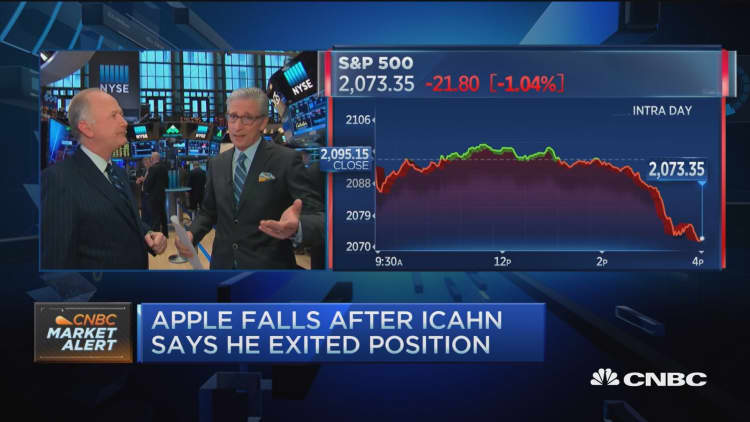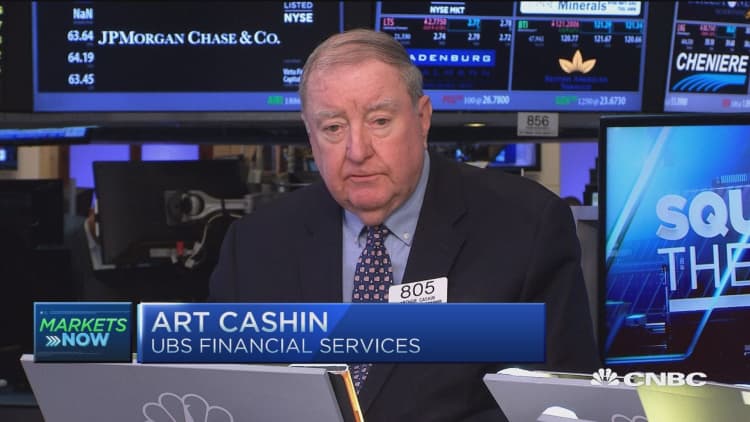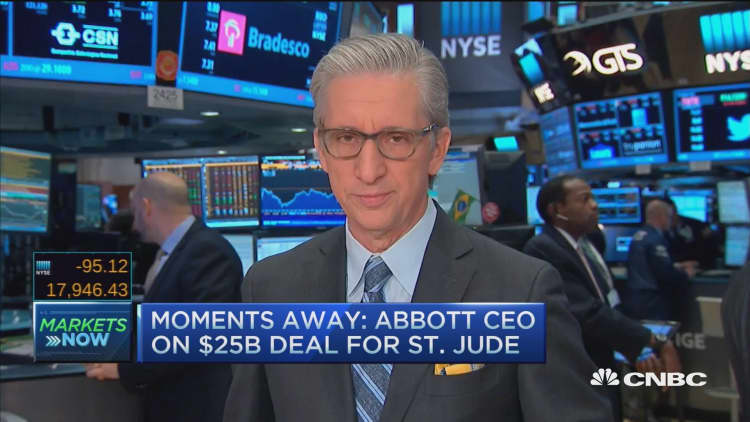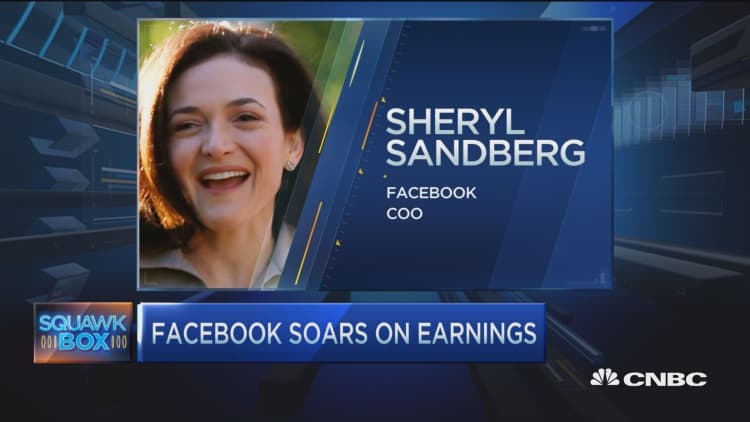



U.S. stocks closed about 1 percent lower or more Thursday, as fresh declines in Apple weighed on the major averages. (Tweet This)
"The market had been losing momentum coming into the week as the tech stocks were coming in with weaker numbers," said Quincy Krosby, market strategist at Prudential Financial.
"Apple is in many different kinds of portfolios, it's in the Dow. When it takes a beating it's going to pressure markets," she said.
The Dow Jones industrial average closed down more than 1 percent for the first time since Feb. 23, and off more than 200 points for the first time since Feb. 11, the so-called "Dimon" bottom. Overall, the Dow also had its worst daily performance since Feb. 11 with a loss of 1.17 percent.
The Dow and S&P 500 ended the day within 3 percent of their 52-week intraday highs, while the Nasdaq composite was more than 8 percent below that high.
Jeremy Klein, chief market strategist at FBN Securities, said stocks tested Wednesday's highs before "we just started bleeding lower and Apple (taking a) leg lower on Carl Icahn comments weighing on the broader market as well, given its influence on that."
"It's still pretty quiet. People want to move on from (month-end)," he said.
Apple closed down 3.08 percent, off session lows but following a more than 6 percent plunge Wednesday on disappointing earnings. Activist investor Carl Icahn told CNBC's "Power Lunch" Thursday afternoon that "we no longer have a position in Apple" while noting the firm is a "great company."
Read MoreIcahn: We no longer have a position in Apple
Earlier, the indexes attempted to recover most or all of their opening losses, helped by gains in Facebook, as stocks mostly shook off pressure from sharp declines in the Nikkei 225 overnight after the Bank of Japan kept policy unchanged.
The "Bank of Japan doesn't have a big effect on the U.S. stock market today. The U.S. is still in much better shape economically from a central bank perspective," said Ben Pace, CIO at HPM Partners.
Facebook closed up 7.2 percent after briefly rising rose more than 10.5 percent to hit a fresh all-time high in intraday trade. The firm reported quarterly earnings well above expectations on both the top and bottom line, helped by a sharp increase in mobile advertising revenue. The social media giant also proposed a new share structure.
Shares of Amazon.com gave up earlier gains to close 0.75 percent lower ahead of its earnings due after the close.
Read MoreLooking for the next big thing in Amazon earnings
The major U.S. averages opened lower before coming well off lows. Overnight, the Bank of Japan maintained the pace of its asset purchase program and kept steady its 0.1 percent negative rate it applies to some deposits. The central bank also cut its inflation forecasts and again pushed back the timing for hitting its 2 percent price target by six months.
"I think, in talking to investors, there's a real credibility question with the Bank of Japan," said Chris Gaffney, president, EverBank World Markets.
"Right now, it's more of the same, and that's why we're seeing a lot of sideways trading here," he said.
The Nikkei 225 closed 3.6 percent lower, while the yen strengthened against the U.S. dollar, last trading around 108.12 yen. The dollar index was about 0.65 percent lower, with the euro near $1.135.
"I think it is hedge funds and other momentum players to sell the Nikkei and sell the U.S. market in sympathy," said David Kelly, chief global strategist at JPMorgan Funds.
The Shanghai composite was off about 0.3 percent while the Hang Seng closed mildly higher. European stocks came off lows to close mostly higher.
Read MoreKensho stats: Investing in this low-growth world
In U.S. economic news, the first quarter U.S. GDP advance read was 0.5 percent, the slowest pace since the first quarter of 2014. Consumer spending increased at a 1.9 percent rate, the slowest since the first quarter of 2015 and down from the fourth quarter's 2.4 percent rate.
However, most analysts expect growth to recover later in the year, especially as oil prices stabilize and the labor market remains solid.
Weekly jobless claims rose to 257,000, but the four-week moving average of claims fell to the lowest since December 1973.
Treasury yields edged lower, with the near 0.78 percent and the 10-year yield around 1.83 percent.
On Wednesday, the Federal Open Market Committee kept rates unchanged and did not rule out the possibility of a June hike, while noting appearances of slowdown in economic activity.
Post the statement release, the Dow and S&P closed slightly higher, within 2 percent of their all-time highs, but the Nasdaq ended lower as declines in Apple weighed.
Major U.S. Indexes
U.S. stock index futures were lower overnight after the Bank of Japan kept policy unchanged.
"The S&P futures are lower this morning along with most international markets," BTIG Chief Technical Strategist Katie Stockton said in a morning note. "The bearish reaction to the BOJ announcement has the potential to give way to an "outside-down" day in the major indices, which would support a deeper pullback."
"Nevertheless, the SPX is still flirting with resistance near 2090, and has the opportunity to confirm a breakout if it rebounds into Friday's close," she said. "In this sense, the price action today and tomorrow holds a lot of weight."
Read MoreEarly movers: STJ, F, FB, DNKN, AET, RTN, BZH, CAB & more
The Dow Jones industrial average closed down 210.79 points, or 1.17 percent, at 17,830.76, with Apple leading all constituents lower.
The closed down 19.34 points, or 0.92 percent, to 2,075.81, with information technology leading nine sectors lower and consumer staples the only gainer.
The Nasdaq composite closed down 57.85 points, or 1.19 percent, at 4,805.29.
The CBOE Volatility Index (VIX), widely considered the best gauge of fear in the market, jumped more than 10 percent to hit a high of 15.61, its highest level since April 12.
About two stocks declined for every advancer on the New York Stock Exchange, with an exchange volume of 1.0 billion and a composite volume of about 4.2 billion in the close. U.S. composite volume was the highest since mid-March.
U.S. crude oil futures settled up 70 cents, or 1.54 percent, at $46.03 a barrel, its highest since Nov. 4, 2015.
Gold futures for June delivery settled up $16 at $1,266.40 an ounce.
—Reuters contributed to this report.
On tap this week:
Friday
Earnings: AstraZeneca, Chevron, Exxon Mobil, Novo Nordisk, Sanofi
6:30 a.m. Dallas Fed President Rob Kaplan
8:30 a.m. Personal income; employment cost index
9:45 a.m. Chicago PMI
10 a.m. Consumer sentiment
*Planner subject to change.
More From CNBC.com:






